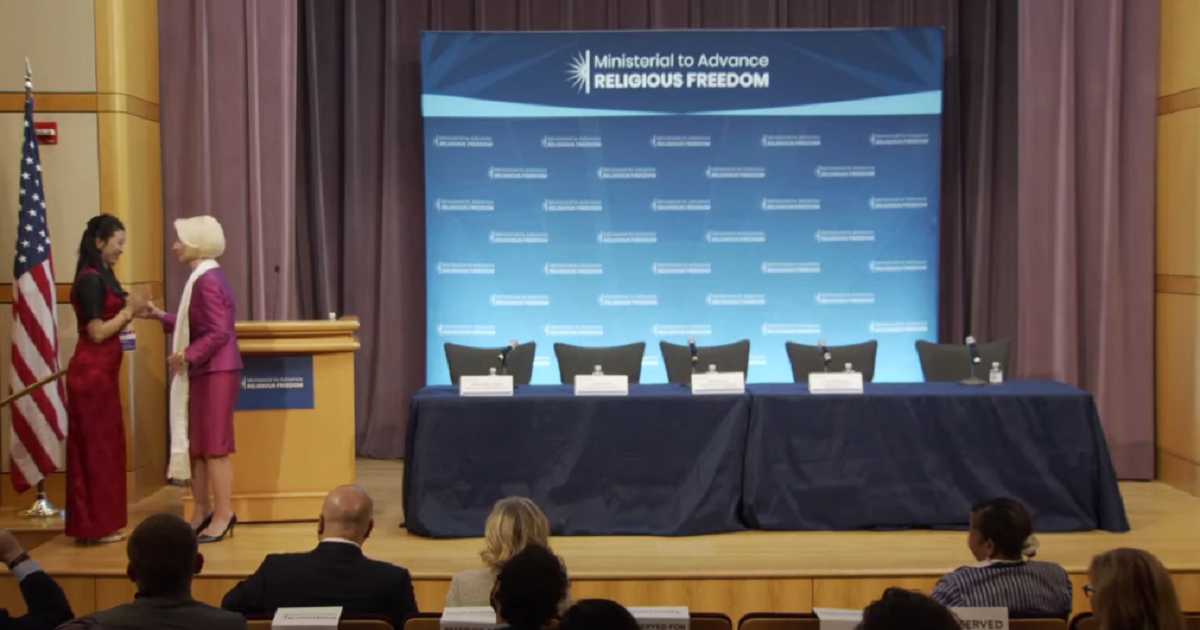In 2015, Tenzin Delek Rinpoche, a revered Tibetan lama, died mysteriously in a Chinese prison.
On Wednesday, his niece spoke at a major gathering in Washington, DC and urged the governments of the world to hold China accountable for his death.
“We, his family members, believe that that is a suspicious death,” Nyima Lhamo said, “and we believe the Chinese authorities killed Rinpoche.”
Nyima Lhamo was speaking at the Ministerial to Advance Religious Freedom, an event hosted by the US State Department to bring together stakeholders from around the globe—including government officials, religious leaders and civil society activists—who are working to promote international religious freedom.
Nyima Lhamo gave her presentation during the ministerial’s second day. She was introduced by US Ambassador to the Holy See Callista Gingrich, who described her as “an incredible young woman.”
 Nyima Lhamo is welcomed to the stage by Ambassador Callista Gingrich.
Nyima Lhamo is welcomed to the stage by Ambassador Callista Gingrich.
Uncle’s death
Nyima Lhamo began her remarks by mentioning how Tenzin Delek Rinpoche was recognized by the Dalai Lama and became well-known in Tibet—a historically independent country that China has brutally occupied for the past 60 years—for his social work, including building medical, educational and religious institutions.
“It’s because of this that the Chinese government was fearful of him, and therefore they detained Rinpoche and his assistant Lobsang Dhondup,” Nyima Lhamo said, her words translated into English by an International Campaign for Tibet staff member.
In 2002, Chinese authorities falsely accused Rinpoche of bombing a park, then sentenced him to death—later reduced to life in prison—after an unfair trial where he was denied independent legal counsel. Lobsang Dhondup, who was convicted of the same crime, was executed in 2003, despite the Chinese government’s promise to conduct an investigation first.
In 2015, Chinese officials said Rinpoche had died in prison from a heart attack. Nyima Lhamo and her relatives protested against being denied the right to see his body, with Nyima Lhamo even attempting suicide before they were finally briefly granted permission.
Rinpoche’s corpse was cremated without an autopsy, and his family was not able to hold a proper funeral.
“The inhumanity of the Chinese government can be seen by the fact that even we, his relatives, were not given the opportunity to do the final rites for him according to Tibetan Buddhist tradition,” Nyima Lhamo said.
Fleeing to seek justice
For challenging the Chinese government’s account of Rinpoche’s death, Nyima Lhamo and her mother were arrested.
In 2016, Nyima Lhamo fled Tibet—leaving behind her mom and six-year-old daughter—to make the world aware of Rinpoche’s case.
Despite the Chinese government threatening to persecute her family in Tibet, Nyima Lhamo has continued to speak out. On Wednesday at the ministerial, she asked “the international community to urge the Chinese government to account for Rinpoche’s death.”
Nyima Lhamo had other recommendations for bringing religious freedom to Tibet, which a major watchdog group routinely calls the second-least-free place on Earth, behind only Syria.
Nyima Lhamo said the Chinese government should allow foreign journalists, diplomats and citizens to have access to Tibet so they can assess the situation there themselves.
She also spoke about the issue of China’s attempts to interfere in the eventual reincarnation of the Dalai Lama, saying “I know for certain that more than 90 percent of the Tibetans will follow whatever the Dalai Lama says and not the Chinese government.”
Earlier, Gingrich, the ambassador to the Holy See, addressed the Dalai Lama’s reincarnation, saying to applause that, “The international community must unequivocally insist that members of the Tibetan community, like members of all faith communities, should be able to select and revere their religious leaders without government interference.”

Nyima Lhamo also touched on the case of the Panchen Lama—who has not been seen in public since China abducted him as a six-year-old boy in 1995—saying that if anything happens to him or other political prisoners in Tibet, the Chinese government should be held solely responsible.
Finally, Nyima Lhamo asked for the international community to continue to help the Dalai Lama and the Tibetan people in their struggle for a political solution to China’s brutal rule in their land.
Nyima Lhamo had optimistic things to say about the ministerial, noting: “During my two days of participation over here, when I looked at the participants, I have seen that we are of different colors, we’re of different ethnicities, we’re from different religious traditions, but we’re all bound together by this solidarity about religious freedom. Therefore I firmly believe that if we can continue with this solidarity and continue with this push for religious freedom, together we can make this world a better place.”